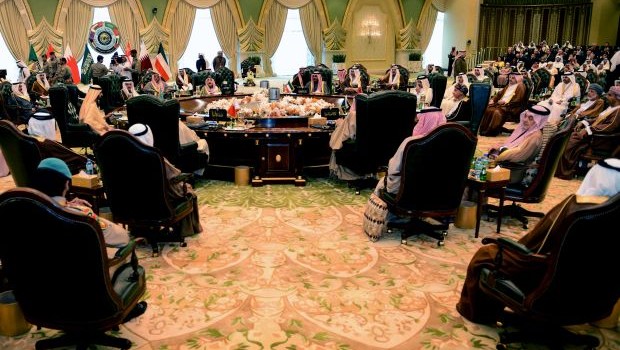
A general view of the last session of the 34th Gulf Cooperation Council (GCC) summit held in Kuwait, on Wednesday, December 11, 2013. (AP/Gustavo Ferrari).
Riyadh, Asharq Al-Awsat—The Gulf Cooperation Council (GCC) announced that it had reached an agreement on mechanisms to implement a security pact on Thursday, following diplomatic tensions over the issue that had seen Saudi Arabia, the UAE and Bahrain withdraw their ambassadors from Qatar.
GCC Foreign Ministers met in Riyadh on Thursday to discuss a “comprehensive review of measures relating to foreign and security policies,” according to a joint statement from the regional body.
Participants “agreed to adopt measures that ensure working at a group level and that policies of any individual state should not affect the interests, security or stability of any other member state and without affecting the sovereignty of any of its states,” the Saudi Press Agency (SPA) reported.
“The ministers conveyed the endorsement of their countries for the mechanism of the implementation of the Riyadh Document, which is based on the principles of the GCC,” the statement added.
Thursday’s agreement comes after Saudi Arabia, the UAE and Bahrain took the decision to withdraw their ambassadors from Qatar, saying that Qatar had failed to commit to the principles of the GCC over Doha’s refusal to implement the Riyadh Document.
A joint statement issued by the three GCC states on the issue made reference to a “meeting of foreign ministers of the GCC countries in Riyadh on April 4 during which “big attempts” were made to persuade Qatar to take the necessary measures to put the Riyadh Document into effect and agree on a mechanism to monitor its implementation.
“However, all these efforts have not resulted, with great regret, in the consent of the State of Qatar to adhere to these procedures, so the three countries have to start taking whatever [measures] they deem appropriate to protect their security and stability by withdrawing their ambassadors from the State of Qatar,” that statement added.
GCC foreign ministers hailed Thursday’s agreement as a “historic achievement,” saying it comes “after 33 years of hard work aimed at achieving the best interests of their citizens and paves the way to move to a more secure and stable situation, particularly in facing future challenges in a unified, solid, and coherent way.”
GCC Secretary-General Abdullatif Al-Zayani said that GCC leaders are committed to inter-Gulf cooperation and cohesion.
“Gulf countries become better and stronger by overcoming all obstacles,” Zayani told reporters following the conclusion of the meeting.
